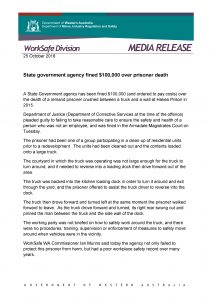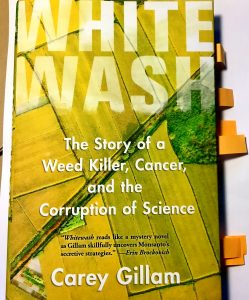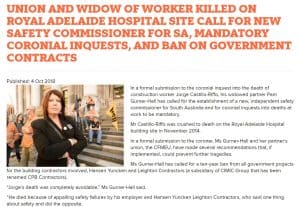 Recently the West Australian Department of Corrections was prosecuted over the work-related death of an inmate. It was fined $100,000 plus costs over the death of a remand prisoner crushed between a truck and a wall at Hakea Prison in 2015. The WorkSafe WA media release provides a level of detail rare in these sorts of incidents and it is recommended reading.
Recently the West Australian Department of Corrections was prosecuted over the work-related death of an inmate. It was fined $100,000 plus costs over the death of a remand prisoner crushed between a truck and a wall at Hakea Prison in 2015. The WorkSafe WA media release provides a level of detail rare in these sorts of incidents and it is recommended reading.
The incident and the prosecution raise enforcement issues that would be familiar to many occupational health and safety (OHS) regulators but also to businesses.

 In 2017 the Queensland Government was advised to prohibit
In 2017 the Queensland Government was advised to prohibit 


 Occupational health and safety (OHS) related decisions are made on the state of knowledge about hazards and it is up to OHS people to make sure the state of knowledge is at its best so that the best decisions can be made. But what do you do if the state of knowledge on a hazard seems to be made purposely uncertain and that uncertainty is leading to the status quo, which also happens to provide a huge income for the owner of the product creating the hazard.
Occupational health and safety (OHS) related decisions are made on the state of knowledge about hazards and it is up to OHS people to make sure the state of knowledge is at its best so that the best decisions can be made. But what do you do if the state of knowledge on a hazard seems to be made purposely uncertain and that uncertainty is leading to the status quo, which also happens to provide a huge income for the owner of the product creating the hazard.